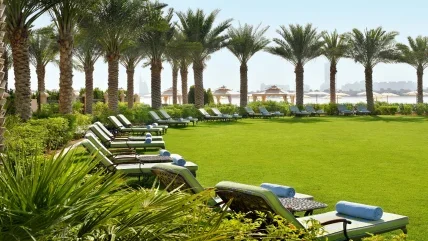
The global hotel industry, a cornerstone of international tourism and local economies, faces mounting challenges from the rapid decline in biodiversity and the looming threat of ecosystem collapse. This article delves into the critical relationship between biodiversity, ecosystem health, and the hospitality sector, highlighting the risks and exploring potential strategies for sustainable management.
Understanding Biodiversity and Ecosystem Collapse
Biodiversity refers to the variety of life on Earth, encompassing the genetic diversity within species, the variety of species themselves, and the range of ecosystems they form. Ecosystem collapse occurs when the biological and physical elements of an ecosystem change so dramatically that it can no longer sustain its previous functions and services.
Key Drivers of Biodiversity Loss:
- Habitat Destruction: Urban expansion, deforestation, and agricultural encroachment significantly reduce natural habitats.
- Climate Change: Altered weather patterns and rising temperatures disrupt species and their habitats.
- Pollution: Chemical pollutants and waste products degrade ecosystems and poison wildlife.
- Overexploitation: Unsustainable hunting, fishing, and resource extraction lead to species decline.
- Invasive Species: Non-native species can outcompete, prey on, or bring diseases to indigenous populations.
The Hotel Industry’s Stake in Biodiversity
Hotels, especially those in regions renowned for natural beauty, directly depend on the health of local ecosystems. Pristine beaches, vibrant coral reefs, lush forests, and diverse wildlife are pivotal attractions that draw tourists. The degradation of these natural assets can severely impact a hotel’s appeal, occupancy rates, and overall revenue.
Implications for the Hotel Industry:
- Loss of Natural Attractions: Many hotels boast proximity to unique ecosystems. Degradation of these areas can reduce tourist interest.
- Increased Operating Costs: Ecosystem services like water purification, flood control, and pest management are costly to replace.
- Regulatory Pressures: Governments worldwide are implementing stricter environmental regulations, impacting operational practices.
- Reputational Risks: Modern consumers increasingly favour eco-friendly brands. Failure to address biodiversity issues can harm a hotel’s image.
Case Studies: Biodiversity in Hotel Operations
1. Coral Reef Resorts: Coral reefs are critical for marine biodiversity, offering habitat for countless species. Resorts in the Caribbean, Southeast Asia, and the Pacific face direct threats from coral bleaching and destruction. For instance, the Great Barrier Reef, a major tourist draw for Australian hotels, has seen significant damage from climate change. Hotels in these regions must invest in reef conservation and sustainable practices to preserve their primary attractions.
2. Rainforest Lodges: Rainforests are biodiversity hotspots but are also vulnerable to deforestation and climate change. Eco-lodges in the Amazon and Central Africa rely on rich wildlife and flora. Initiatives like the Rainforest Alliance’s certification help hotels implement sustainable practices, ensuring the long-term viability of these ecosystems.
Strategies for the Hotel Industry
1. Sustainable Tourism Practices: Sustainable tourism minimises environmental impact while contributing to the conservation of biodiversity. Hotels can adopt eco-friendly building materials, reduce waste, conserve water, and use renewable energy sources. Partnering with local conservation groups and participating in certification programmes like LEED or Green Key can bolster sustainability efforts.
2. Community Engagement and Education: Hotels can play a pivotal role in educating guests about biodiversity and sustainable practices. By promoting eco-tourism activities such as wildlife tours, reef-safe diving, and guided nature walks, hotels can foster a deeper appreciation of natural environments. Additionally, supporting local communities through fair trade and eco-friendly products can enhance biodiversity conservation efforts.
3. Investing in Conservation Initiatives: Direct investment in local conservation projects can help maintain and restore ecosystems. Hotels can collaborate with NGOs, government bodies, and research institutions to fund and participate in conservation efforts. This could involve reforestation projects, wildlife protection programmes, and initiatives to control invasive species.
4. Monitoring and Reporting: Implementing systems to monitor the impact of hotel operations on local ecosystems is crucial. Regular environmental audits, biodiversity assessments, and transparent reporting help identify areas for improvement. Engaging with third-party organisations to verify and certify sustainable practices can build credibility and trust with eco-conscious travellers.
The Business Case for Biodiversity
Protecting biodiversity is not merely an ethical responsibility but a sound business strategy. As travellers become more environmentally conscious, hotels that demonstrate genuine commitment to sustainability can differentiate themselves in a competitive market.
Benefits of Biodiversity-Friendly Practices:
- Enhanced Brand Loyalty: Eco-conscious customers are more likely to choose and remain loyal to brands that prioritise environmental stewardship.
- Cost Savings: Efficient resource use, waste reduction, and renewable energy can lower operating costs over time.
- Access to New Markets: Eco-certification can open doors to new customer segments and travel agents specialising in sustainable tourism.
- Risk Mitigation: Proactively addressing environmental risks can help hotels avoid regulatory fines and reputational damage.
Challenges and Opportunities
Challenges:
- Initial Investment Costs: Implementing sustainable practices often requires significant upfront investment.
- Training and Education: Staff must be adequately trained in sustainable practices, which requires time and resources.
- Balancing Profit and Sustainability: Hotels must find a balance between profitability and the costs associated with biodiversity conservation.
Opportunities:
- Innovative Solutions: Advances in technology offer innovative solutions for sustainability, such as energy-efficient systems, waste-to-energy technologies, and water recycling programmes.
- Collaborative Efforts: By collaborating with other industry players, NGOs, and governments, hotels can amplify their impact on biodiversity conservation.
- Positive Publicity: Effective sustainability programmes can generate positive media coverage and enhance a hotel’s reputation.
Conclusion
The hotel industry stands at a crossroads, where the decline in biodiversity and the threat of ecosystem collapse pose significant risks but also present unique opportunities for sustainable development. By embracing sustainable tourism practices, investing in conservation, and engaging with local communities, hotels can not only mitigate their environmental impact but also ensure their long-term viability and success. As the guardians of some of the world’s most treasured natural landscapes, the hotel industry has both a responsibility and a vested interest in preserving the biodiversity that underpins its very existence.






